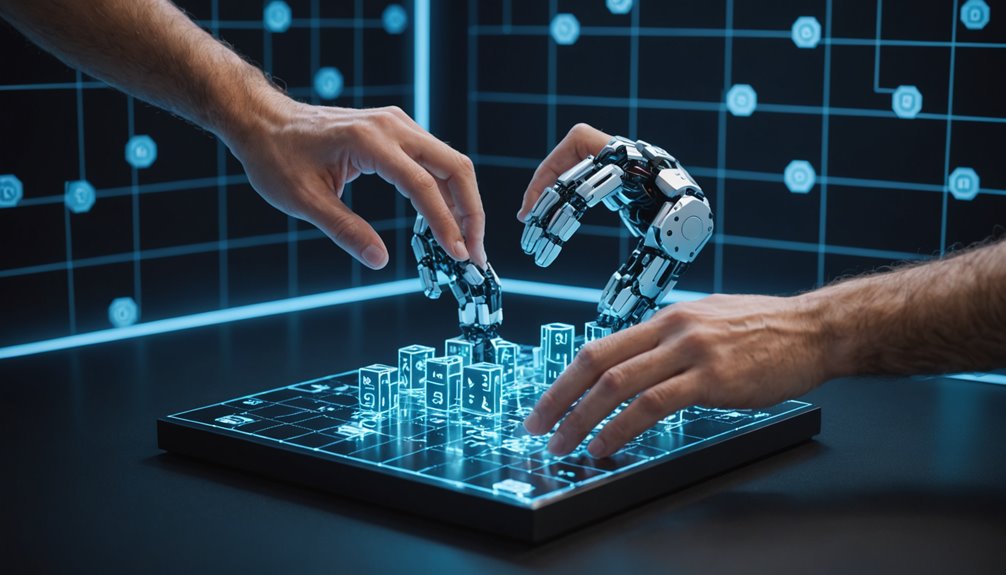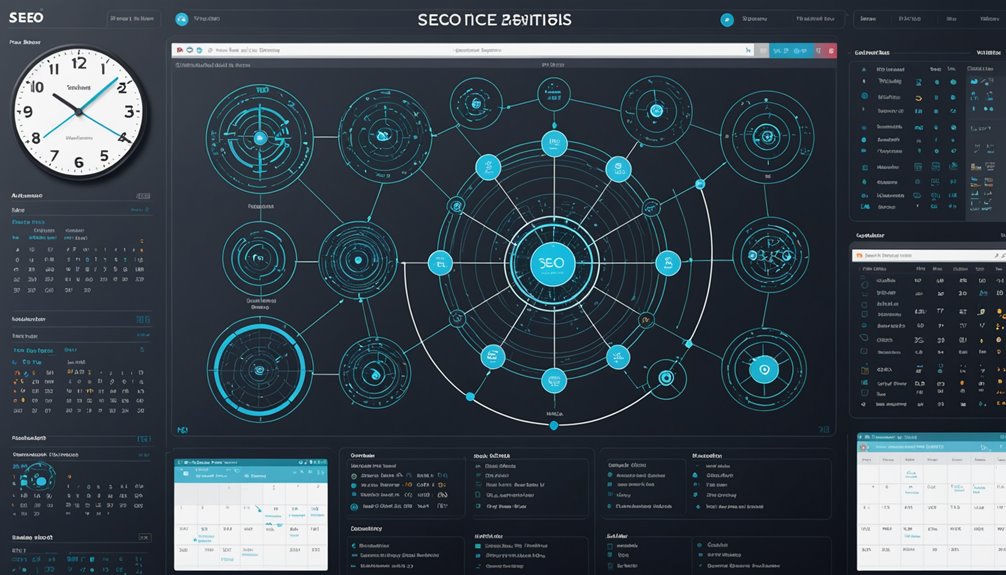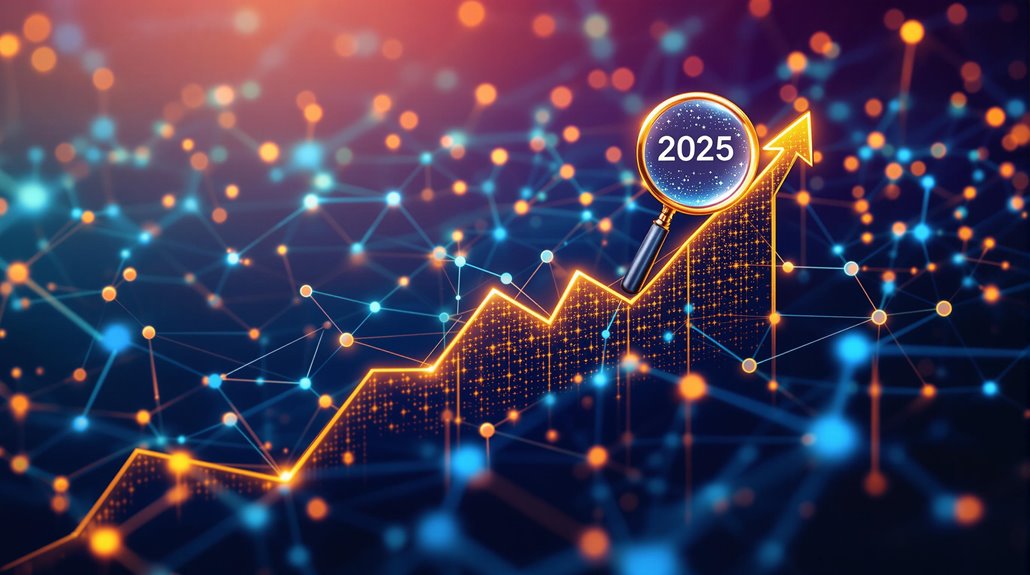In 2025, AI is revolutionizing SEO in ways we could only dream of a few years ago. Imagine having a tool that doesn’t just help you pick the best keywords but actually learns what your audience wants before they even type it into a search bar. AI takes the guesswork out of SEO, helping businesses create better content, design more user-friendly websites, and connect with their customers in ways that feel personal and effortless.
AI is revolutionizing SEO by simplifying complicated tasks like finding keywords, organizing website content, and writing those little descriptions you see under links in a search engine. But it doesn’t stop there! AI is like a crystal ball for SEO—predicting trends and figuring out what people are likely to search for next. This means you can stay ahead of the competition and give your audience exactly what they need right when they need it.
The future of SEO is here, and it’s not just for tech experts—it’s for everyone. Whether you run a business, manage a blog, or want your website to shine, learning about AI in SEO opens doors to incredible opportunities. It’s never been easier to create a digital strategy that works smarter, not harder. Ready to dive in and explore how AI can transform your SEO game? Let’s talk about it.
How AI is Revolutionizing SEO Practices at LaunchedKey Takeaways
- AI will shift SEO strategies from keyword-centric to long-tail queries and AI-generated overviews for better rankings.
- Due to AI’s influence, user engagement, E-A-T guidelines, and video content recognition will become crucial ranking factors in 2025.
- AI tools like Jasper AI and Surfer SEO will facilitate data-driven content creation and trend analysis for improved SEO strategies.
- Predictive SEO enabled by AI will help marketers proactively adjust strategies, capitalizing on trends for better search ranking. AI’s role in sales automation will optimize SEO strategies, enhancing productivity and customer relationship management for improved rankings.
AI Impact on SEO
In the dynamic world of digital marketing, the impact of Artificial Intelligence (AI) on Search Engine Optimization (SEO) cannot be overstated. AI transforms SEO by automating content generation, enhancing search engine result page (SERP) features, and refining SEO strategies.
AI tools automate processes such as keyword optimization, content structuring, and meta-tag writing, freeing marketers to focus more on strategic decision-making. By generating descriptions aligned with user intent, AI improves click-through rates and engagement, thereby driving traffic and potential conversions. Moreover, AI and automation tools streamline SEO operations, providing insights and enhancingcommunication with prospects.
AI also refines SERP features, interpreting complex queries and providing results based on user intent. To stay competitive, businesses must optimize content for features like Featured Snippets, People Also Ask, and voice search results. AdditionallAI’sI’s ability to analyze and rank visual content necessitates thorough optimization.
Furthermore, AI compels a shift in SEO strategies, prioritizing hyper-individualization and intent-driven approaches. AI agents gather contextual data to provide tailored recommendations, making dynamic relevance a necessary consideration. Lastly, AI integration in SEO tools accelerates workflows and improves efficiency, with platforms like StoryChief automating SEO audits and content conversion, thereby ensuring an ideal user experience. In addition, AI contributes to advanced user experience (UX) performance by providing deep insights into user behavior, thereby refining website UX and ultimately boosting SEO (user behavior insights).
AI-Driven Search Trends
ArtiIntelligence transforms SEO strategies and drives the evolution of search trends. AI-powered search engines like Google and Microsoft Microsoft use machine learning and natural language processing (NLP) to deliver hyper-customized results, improving user experience and engagement.
In 2025, AI search trends are set to change digital marketing. Predictive SEO, powered by AI, will enable businesses to identify and capitalize on emerging trends before they peak. Companies can leverage AI technologies like machine learning and personalization to understand user behavior and deliver tailored content, enhancing engagement and relevance (machine learning and personalization).
Furthermore, the integration of AI in small enterprise strategies has revolutionized data analysis, allowing for accurate audience segmentation and targeted campaigns (AI marketing tools).
Improved cybersecurity, powered by AI’s autoAI’s code analysis and vulnerability identification, will indirectly influence search trends by ensuring a secure digital environment. Furthermore, AI’s integration into scientific research is expected to accelerate findings in diverse domains, possibly affecting future search technologies.
AI-driven search will also impact web development, improving the coding process and assisting with debugging. Thanks to multimodal AI that can process multiple forms of input, search engines will evolve to be characterized by more person-like interactions. These advancements represent a shift towards a more individualized, user-centric approach to search, indicative of AI’s potential in shaping the future of SEO.
AI in Content Strategy

Often underscoring its critical role in shaping online marketing, AI has emerged as a powerful tool for content strategy. AI’s ability to understand complex user queries and intentions positions it as a critical asset in the era of hyper-individualization. By aligning content with user intent, businesses can create tailored experiences that set them apart in a competitive online environment.
However, the integration of AI in content creation should be balanced with individual insights. While AI improves scalability and efficiency, it often falls short in providing distinctive personal perspectives. This underscores the need for brands to use AI as a support tool for human-generated content, upholding Google’s Google’sT standards that emphasize the importance of expertise and genuineness.
Moreover, an effective AI-augmented strategy involves optimizing content for AI platforms. The emerging concept of Generative Engine Optimization (GEO) and the use of structured, schema-enriched content are pivotal in this regard. Adapting content to meet AI SEO best practices not only maintains brand visibility but also opens avenues for increased traffic and conversions.
In this context, incorporating sales automation in content strategy can prove to be a game-changer, leading to increased engagement rates by providing personalized interactions and messages.
SEO Predictions for 2025
Advancements in technology and the evolving online environment are set to shape the future of SEO significantly by 2025. As AI-driven search prioritizes conversational and intent-based queries, traditional keyword-focused strategies will give way to long-tail queries and AI overviews in SERPs. This shift will necessitate a focus on technical SEO, quality, and adherence to E-A-T guidelines in AI-generated content. Consequently, traditional position tracking will become less effective due to individualized SERPs and AI overviews.
The rise of zero-click searches as AI provides direct answers will reduce natural traffic and click-through rates. Therefore, optimizing for AI tools, building brand recognition, diversifying traffic sources, and investing in digital PR will become essential for SEO success. Monitoring algorithm updates across multiple search engines will become critical to adapt SEO strategies.
Ranking factors will evolve with video content recognition, click behavior, user engagement, website health, and E-A-T becoming more significant. Algorithms may improve subsequent searches, deprioritizing ineffective sites. Emphasizing user experience (UX) and Core Web Vitals will be crucial for rankings. Utilizing tools for technical SEO, trend analysis, site optimization, and user behavior tracking will be indispensable for SEO strategies in 2025.
In this evolving landscape, sales automation’s benefits can also be leveraged to optimize SEO strategies by streamlining operations and providing valuable insights into customer interactions. This automation can lead to a strategic advantage in business growth, particularly as AI and machine learning continue to revolutionize digital marketing and SEO techniques. The inclusion of sales automation in SEO strategies can lead to enhanced productivity and efficiency in managing customer relationships, potentially increasing revenue generation and sustainable growth.
AI Tools in SEO Workflows

The integration of AI tools in Search Engine Optimization workflows is increasingly becoming a game-changer in the digital marketing landscape. AI SEO tools like Jasper AI, Surfer SEO, and SemRush utilizedata-driven insights to automate content creation, keyword research, technical SEO auditing, and performance tracking. This automation not only increases efficiency and accuracy but also allows for scalability and individualized SEO strategies.
In addition to these features, AI tools are improving SEO through predictive analysis, enabling marketers to forecast trends and adjust strategies proactively. Platforms such as ContentShake AI and Semrush Copilot are revolutionizing content optimization, while others like Copy.ai offer workflow automation. With the use of AI, even challenges in lead generation, like defining an Ideal Customer Profile (ICP), can be streamlined, leading to more targeted and efficient marketing strategies (ICP in marketing).
For technical SEO, Botify and DeepCrawl (Lumar) guarantee a seamlessly crawlable site, and tools like SERP Gap Analyzer and Perplexity are reshaping keyword analysis. The future of SEO is not just about algorithms but also about utilizing the power of AI to improve decision-making processes, streamline workflows, and create targeted, user-focused strategies. Whether it’s through AI insights from SEO Search Grader or individualized content from SEO.ai, AI is undoubtedly revolutionizing SEO workflows.
Moreover, these AI tools also enable a thorough understanding of different types of user intent (informational, navigational, transactional), which is crucial for tailoring content to specific user needs. This understanding of user intent is integral in creating more effective SEO strategies.
Frequently Asked Questions
What Are the Potential Drawbacks of AI Implementation in SEO Strategies?
Potential drawbacks of AI implementation in SEO strategies include risks of content duplication, factual inaccuracies, and bland content. It may reduce natural traffic and user engagement, while over-reliance can lead to vulnerability to SEO penalties.
How Can Businesses Ensure Their Content Remains Relevant Amidst AI-driven Search Trends?
Businesses can guarantee relevancy amidst AI-driven search trends by regularly auditing content, optimizing for search intent, incorporating structured data, and adapting to changes in user behavior and technology advancements in actual time.
How Does AI Affect Local SEO and Geographically Targeted Searches?
AI improves local SEO by individualizing search results, refining user behavior interpretation, and optimizing voice search. It integrates multiple platforms for better visibility and focuses on hyper-local searches, transforming geographically targeted search strategies for enriched user experiences.
What Are the Privacy Implications of Using AI in SEO and User Data Analysis?
AI’s role in SAI simplifies privacy concerns. With increased data collection for customization, businesses must guarantee regulatory compliance, secure data handling, and transparency, mitigating risks of breaches and fostering user trust in AI-driven digital marketing strategies.
Are There Specific Industries or Sectors That Will Benefit More From AI in SEO?
Specific sectors, such as healthcare, e-commerce, finance, and SaaS, stand to benefit considerably from AI in SEO. Improved content accuracy, individualized experiences, and improved data analysis are some advantages these industries can utilize.
Conclusion
To sum up, the advent of AI is transforming the landscape of SEO. By optimizing search trends, refining content strategies, and streamlining SEO workflows, AI is poised to innovate rankings. As 2025 approaches, these advancements will only increase, reshaping the SEO industry as we understand it. This digital metamorphosis, driven by AI, promises to be a game-changer, leading to improved rankings, boosted user experience, and a more competitive digital marketplace.

Erik Remmel is a co-founder of Launched, a platform that helps businesses grow through AI-powered marketing, automation, and lead generation. He focuses on building scalable systems that convert cold leads into customers while streamlining operations with smart, AI-driven workflows.

